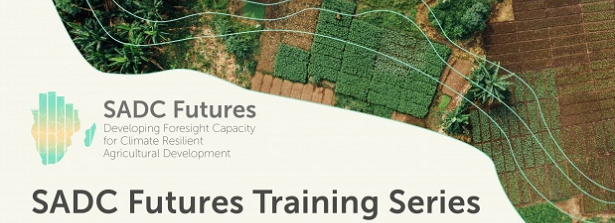
During the SADC Futures Training Series participants develop skills and capacity for applying foresight for climate resilient agricultural development. The six training webinars will be run every Wednesday 14:00 to 16:00 pm between Wednesday June 17 and Wednesday July 22. The webinars will be conducted on Zoom.
This training series is a joint initiative of the SADC Secretariat’s Food, Agriculture and Natural Resources (FANR) Directorate, the Centre for Coordination of Agricultural Research and Development for Southern Africa (CCARDESA), the International Livestock Research Institute (ILRI) through the CGIAR Research Program on Climate Change, Agriculture and Food Security (CCAFS) and German Development Cooperation facilitated through the SADC / Deutsche Gesellschaft fur Internationale Zusammenarbeit (GIZ) GmbH ‘Adaptation to Climate Change in Rural Areas’ programme (ACCRA), funded by the German Federal Ministry for Economic Cooperation and Development (BMZ).
Online registration for the training series.
In these highly uncertain and rapidly changing times, the SADC region, like many regions in Africa, remains fundamentally dependent on a resilient agriculture system and natural resource base. Climate change still poses the greatest threat to the agricultural system and therefore technical capacity is needed to address these future impacts and adapt plans, policies and programs.
Taking into account alternative futures, this tailored foresight training equips users to practically apply the range of foresight tools and methods for innovative strategic planning and policy formulation for climate resilience.
Approach
This virtual training webinar series will get participants ready to apply practical and concrete foresight tools and methods to plan for climate resilience in agriculture and natural resource management in the SADC Region and beyond. Participants will engage in interactive excercises during the six webinars and get a complementary Toolkit Manual at the end of each webinar and open access to the Foresight Training Resource Centre and forthcoming e-learning course which will all be accesses on the CCARDESA website.
A certification of participation will be awarded to participants who take part in all of the six inter-linked training webinars.
Schedule
The six training webinars will be run every Wednesday 14:00 to 16:00 pm between Wednesday June 17 and Wednesday July 22. The webinars will be conducted on Zoom.
Webinar 1: Introducing foresight for agriculture and climate change planning and how foresight has been applied in the region (17 June 2020)
Webinar 2: Understanding regional trends, multi-sectoral and systems linkages and climate risks in the region (24 June 2020)
Webinar 3: Visioning, causal analysis and integrating climate resilience into future planning (1 July 2020)
Webinar 4: Introducing scenarios and building multiple scenarios to consider in future planning (8 July 2020)
Webinar 5: Using scenarios to take into account uncertainties and create more robust and transformative climate resilient policies and plans (15 July 2020)
Webinar 6: Review of key foresight methods and tools and tailoring practical action to agriculture and climate change future planning and implementation in the SADC region (22 July 2020)
Audience
The virtual training is designed for regional and national government, civil society, research and private sector aligned to agriculture, food systems and climate change across the SADC Region. Target stakeholders include policy makers and technical officers and representatives of farmers’ organizations, media, academia, advisory services, women and youth focused organizations as well as potential financiers and development partners. The training is also beneficial for anybody working at policy level in terms of foresight and scenario development tools and within other regions across Africa.
- This event has passed.

